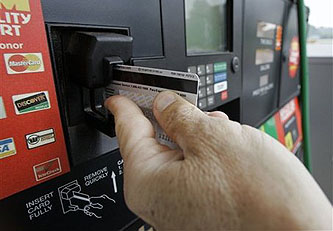Felix Salmon has a nice post about the hidden fees banks charge to sustain their business. It starts like this:
Why do most people hate their bank? Because their relationship is based on the lie of “free checking”, and a relationship based on a lie is always going to be a dysfunctional relationship. Checking is never free, but in recent years banks have been able to conjure the illusion of free through a system of regressive cross-subsidies, where the poor pay massive overdraft fees and thereby allow the rich to pay nothing.
Interchange fees are a cross-subsidy too: this time it’s merchants who help pay for the checking accounts of the rich. In fact, they do more than pay for their checking accounts, they pay them a nice tax-free income, when the rich people accept debit rewards cards.
This is fundamentally my problem with overdraft and interchange fees: they’re basically surreptitious ways for the poor to subsidize the rich.  There’s no law against that, of course, but the practice is so grotesque that in this case I’m perfectly willing to make one.
There’s no law against that, of course, but the practice is so grotesque that in this case I’m perfectly willing to make one.
Basically, what banks have learned is this: it’s mostly poor people who pay overdraft fees. That makes sense, of course: they’re the ones most likely to run out of money, aren’t they? The thing is, it’s easy to fool unsophisticated consumers into not noticing these fees, or into thinking that they’ll never have to take advantage of them. But banks know better. They know to three decimal places how often low-income customers are likely to screw up slightly and overdraw their account by twenty bucks. And when they do, they’re charged obscenely more than the actual cost of servicing the overdraft. So who benefits? I do. I always have plenty of money in my checking account and I’ve never overdrawn it. So the entire debit card system is, for me, free.
The same is true for interchange fees. Banks charge merchants far more in interchange fees than it costs to actually run their payment networks, and merchants pay because they have no choice. Visa and Mastercard are functional monopolies, so if you want to do business with them — and what merchant can afford not to? — you have to pay whatever they tell you to pay. This cost gets passed on to consumers, of course, and the poor and working class pay it. The middle class and the rich, however, don’t: they basically get the fees rebated in the form of reward cards.
So you have two cases here of a system that costs money to operate, and in which the costs are largely borne by the poor in order to make them free (or cheap) to the better off. If you can sleep easily at night even after you understand how this works, you have a heart of stone.
So what’s the alternative? Simple: fees that are fair and transparent. Overdraft fees should cover the average actual cost of overdrafts plus a small amount. Interchange fees should cover the actual cost of operating an electronic payment network. Credit card interest rates should cover the risk-adjusted cost of actually loaning out money.
Beyond that, get rid of reward cards, which are surely one of the most ridiculous and unjustifiable frauds ever invented. Seriously: banks deliberately overcharge their customers and then rebate a fraction of it in the most circuitous and confusing way possible? And to make it worse, they do it in a way deliberately designed to transfer wealth from the poor to the rich? Karl Marx probably wouldn’t have been cynical enough to predict that banks would ever operate like this.
Finally, start charging annual fees again if that’s what it takes to make debit and credit card networks profitable. Felix quotes the president of a credit union that serves a low-income community who says “we don’t want to fee our members.” I sympathize. But the fact is that they already do, and they know it. The only difference is that the fees they charge are hidden, capricious, and generally regressive. We can do better.


















